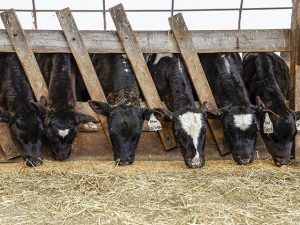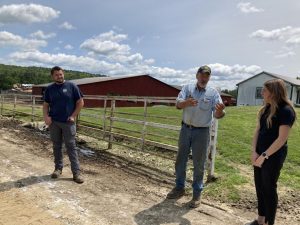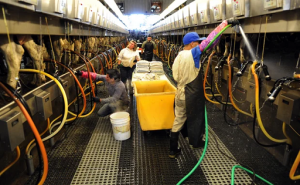
The writing on the baby clothes says things like “My dad’s a farmer.” “New to the herd.” “Next generation farmer.”
But when Dykeman, 33, looks down at his 10-week-old son, Reese, wearing onesies gifted by friends, he’s just not sure.
“I’ve got a new kid at home that I want to raise the same way I was raised. And I’m sitting here going ‘I’m not going to be able to do that. I just can’t,’” Dykeman said.
For Dykeman, of Dykeman and Sons in the town of Glen, and Montgomery County dairy farmers like him, uncertainty arises from a recent 2-1 decision by the Farm Laborers Wage Board to recommend lowering the current 60-hour overtime threshold for farm workers down to 40 hours over the next decade. The Jan. 28 recommendation still has to be officially adopted by The New York State Department of Labor’s commissioner, who could amend the framework. But if the threshold takes effect the way the recommendation currently stands, farmers will eventually have to pay workers time-and-a-half for every hour worked past a 40-hour week in an industry that regularly demands twice the amount of hours of a typical American workweek. Dairy farmers say those extra wages will cut into what are already razor-thin margins.
On the other side, labor groups are championing the Farm Laborers Wage Board’s decision and the threshold’s gradual rollout as a way to ensure fair pay and equal treatment for farm workers, several of whom lobbied for the change during the Jan. 28 Farm Laborers Wage Board hearing. Labor groups also argue that proposed government subsidies will minimize–if not eliminate–the financial burden farmers would face in having to pay the extra wages as a result of the threshold.
Still, dairy farmers in Montgomery County say the 40-hour overtime threshold could be enough to force them to change their way of life, whether that means moving their farming operations to a state that doesn’t have an overtime threshold, or turning to solar-farm developers as a way to make money off their land.
All of it translates to an unsettled future for dairy farmers in Montgomery County and elsewhere, potentially threatening a critical New York state industry. New York is the fourth-largest producer of dairy in the nation, and it is the state’s biggest economic sector, according to the state’s Department of Agriculture and Markets.
That’s why Dykeman says he feels a twinge of melancholy when he looks down at his new son, who may never know what it’s like to be a dairy farmer.
“Even by the time he’s old enough to remember what’s going on, I have no idea what dairy farming is going to be like,” Dykeman said. “We can’t continue to do this without something massive changing.”
PRICE TAKERS
Dairy farmers in Montgomery County say the overtime wage threshold is problematic because their profit margins already operate at a close to break-even rate. In part, that’s because dairy farmers don’t get to set their own prices.
“In the dairy industry, we are a price taker, not a price maker,” said Russ Kelly, who has been running Glenvue Farms in the town of Glen for nearly 50 years and said the overtime threshold could hobble his business, where he employs eight full-time hourly workers. “The price of milk is determined by market conditions and somewhat regulated. So we can’t tell the milk truck guy you’ve got to give us more money today. He’s just going to leave the milk.”
Dairy farmers like the Dykemans are selling a perishable product, meaning it’s not feasible to drive around searching for buyers.
“There have been times we spend the better part of a day–labor and everything–milking these cows, refrigerating the milk from 101 degrees of cow temp down to 33, 34, and it goes to [the trucking company] and they can’t find a home for it. They bring it back here and put it in the manure pit. That happens. We don’t get paid for that,” Kyle Dykeman said.
To avoid this situation, dairy farmers have contracts with processors, who set the monthly price based largely on the Class III commodity rates, which is milk used for cheese, Dykeman explained. (For reference, Class I is liquid milk, Class II is milk used for products like yogurt and ice cream, and Class IV is used for products like powdered milk.)
Though the price in the contracts is based on the commodity market, it’s not strictly tied to the market, with processors having some wiggle room, Dykeman said.
So if it’s possible to get different prices from different processors, why not shop around? Dykeman said consolidation has made that difficult, with many bottling plants closing in recent years. For example, after one bottling plant that the farm sold to in New York City closed, Dykeman and Sons began selling its milk to Fage. But when Fage announced that it was going GMO-free, Dykeman and Sons could no longer sell to the yogurt company because the corn silage feed, of which Dykeman and Sons had already harvested a year’s supply, was a modified organism.
“We can’t just say we’re not going to use 20,000 tons of feed that we spent all year growing,” Dykeman said.
Now, the Dykemans sell their milk out of state.
LIMITING EXPENSES
Dairy farmers say the limited control over their earning potential means they have to do what they can to keep expenses down. The overtime threshold will increase their costs, they say.
Dykeman and Sons employs 33 workers who handle everything from milking roughly 1,300 cows to caring for calves to planting crops like corn for the cows’ feed. Of those workers, about 30 are paid an hourly wage, which can range from the state minimum to $20, said Kyle Dykeman.
In total, Dykeman and Sons spends about $1.9 million on wages annually, Dykeman said.
In the past, workers at the farm averaged about 72 hours per week, according to Raymond Dykeman, Kyle’s father, who has run the farm with his brother for more than 40 years. But the farm dropped those hours to about 65 hours per week once the 60-hour overtime threshold went into effect in 2020 under the Farm Laborers Fair Labor Practices Act.
“We had to get them down to 60 the best we could. They weren’t happy about it. Some of them left. But the problem is the farm can’t afford to pay overtime for all those hours,” said Raymond Dykeman.
As that threshold drops to 40 hours over the course of the next decade the amount of money spent on wages would logically increase, farmers say.
Kyle Dykeman estimated that having to pay overtime with a 40-hour threshold would result in $250,000 more in annual expenses to pay the 23 employees who handle the milking. Paying overtime to the crop team, who tend to make a higher wage and work intensively since they are dealing with short planting and harvesting windows, could result in an additional $200,000, Dykeman estimated.
He said that type of expenditure increase is enough to force farms to considerably scale back or shut down all together.
“We’re a good farm. We’re not mediocre by any means. If we’re good at what we do and we’re not going to be able to still be farming like this, there are a lot of farms that are just going to go out,” Dykeman said. “Everybody wants more money, but not if it’s getting rid of their job.”
SUBSIDIES ARE MEANT TO HELP
Mario Cilento, president of the New York State AFL-CIO, isn’t buying the farmers’ sob stories. That’s because he said Gov. Kathy Hochul’s proposed overtime tax credit in her fiscal year 2023 Executive Budget will offset the costs farmers would have to pay as a result of the extra overtime.
“If the subsidies as they are laid out in the governor’s proposal covered the costs of an increase in overtime pay, what is the problem?” Cilento said. “They are going to be covered dollar for dollar for everything that they have to pay. Nothing is coming out of the pocket of the farm owner.”
The governor’s budget proposes new or increased tax credits that provide farms and farmers in New York with direct support as they face labor shortages, climate change, supply chain issues and potential changes to the overtime threshold, according to information provided by the governor’s Deputy Communications Director of Economic Development Jason Gough.
The budget creates a refundable tax credit for overtime hours paid by farm employers, to offset increasing costs to farmers in the event that the overtime threshold is reduced, Gough said. He explained a refundable tax credit is called “refundable” because if you qualify for a refundable credit and the amount of the credit is larger than the tax you owe, you will receive a refund for the difference. For example, if you owe $800 in taxes and qualify for a $1,000 refundable credit, you would receive a $200 refund, according to Gough.
Other assistance slated for farmers includes increases the Investment Tax Credit for farm businesses to 20%, up from 4%, allowing farmers to purchase new equipment that could further automate their farms in response to the declining agriculture workforce, as well as a doubling of the Farm Workforce Retention Tax Credit to $1,200 per employee, Gough said.
The budget also proposes to invest $43 million in local assistance proposals that benefit farms and farmers–think entities like the Cornell Diagnostic Lab–representing an increase of $15.5 million from last year’s budget proposal, Gough said.
In addition, the budget proposes to invest more than $97 million from the Environmental Protection Fund into programs that benefit farms and farmers, including $20 million for farmland protection, $17.5 million for the Climate Resilient Farms Program and $15 million for Soil and Water Conservation Districts, according to Gough.
But farmers say they would rather not have government subsidies be part of the equation.
“Fun fact: We don’t want handouts. Never have,” said Kyle Dykeman.
To be sure, Dykeman also said federal COVID-19 relief money helped make the farm profitable in 2021.
“I’d rather have them let us compete freely,” he said. “The government tends to implement these things to help the little guys, but they don’t need handouts; they need a market.”
Raymond Dykeman said tax credits still place the onus on the farmers to pay the higher wages up front.
“So I’m going to pay these overtimes throughout the whole year in hopes of getting a tax credit at the end of the year?” he said. “I’m going to have to front-end load all of that.” Plus, Raymond Dykeman added, he worries any government subsidies will only be available temporarily.
FAIR TREATMENT
Cilento said the issue is as personal for him as it is for the farmers. Cilento said the NYS AFL-CIO has been advocating for farm workers’ rights for more than 20 years, dating to efforts to help pass laws in the 1990s guaranteeing that farm workers have access to clean drinking water and sanitary bathrooms.
“We’re talking about human beings here. And what did the farmers say at the time? The farm owners said that the legislation that required access to toilets needed to be watered down to prevent any unnecessary financial burden. So they weren’t even willing to give them a place to go to the bathroom during the day because it may raise their costs. That’s what I’m talking about here,” Cilento said.
He said he’s fighting for farm workers like the ones Kayla Kelechian, New York Immigration Coalition’s manager of Member Engagement for Central New York, read testimony from during the Jan. 28 hearing. That central New York dairy farm worker said she was let go from a previous agricultural job after refusing to clean a dirty toilet, which was not part of her job description. The farm worker said she felt exploited and overworked.
“They would give us so much work, sometimes we could finish and sometimes we couldn’t, but with the same result of being exhausted and with little pay” Kelechian read on behalf of the worker.
The worker, a mother of a 9-year-old, requested the wage board recommend dropping the threshold to 40 hours. “As a mom I want to spend time with my son and have time to upkeep my home and keep it safe and clean.”
Several farm workers expressed similar desires during the hearing.
But farmers in Montgomery County, including the Dykemans, Kelly and Rob Dygert–who is the 13th generation to run Dygert Farms Creamery in Palatine Bridge, which sits on land that was deeded to the family by the British monarchy–all say they treat workers well, including by providing free housing equipped with TV and wireless internet.
Dygert said he employs and houses both his hourly workers, where they milk about 250 cows a week to produce 1,700 gallons of milk at their bottling plant.
Dygert, who is in his early 40s, said he has scaled back his workers’ hours and taken on even more duties himself ever since the 60-hour overtime threshold took effect. But he said as the threshold drops over the course of a decade and eventually falls to 40 hours, he won’t be able to keep workers happy.
Dygert said the hourly crew members he tends to employ typically like to work intensively for a few years and then return to their homes–often in Latin America–to spend a year or so with their families before returning to work.
“They like to do six, 12-hour days if they can. When you drop it to 40 hours, you could theoretically drop them each to 40 and add one more employee, but I don’t think they will be happy at 40 hours because it’s not enough money,” Dygert said. “They come to work and take care of their families back home. They don’t want to just sit around for how many extra hours a week and do nothing.”
WAITING ON AN OFFICIAL RULING
The future of the overtime wage threshold will ultimately be up to New York State Department of Labor Commissioner Roberta Reardon, who can choose whether to adopt the rules as the Farm Laborers Wage Board recommended them or propose changes.
As it stands, the threshold would drop to 40 hours by 2032, with the threshold lowering by four hours per week every other year, starting with a drop to 56 hours in 2024.
The Department of Labor, not surprisingly, didn’t want to weigh in with the decision pending.
“It would be premature to comment until after we receive and review the Farm Laborers Wage Board’s official report,” reads a statement returned by the department’s press office.
The governor’s office is confident that the process will play out in a way that is most beneficial to all parties.
“Governor Hochul is committed to making New York the most business-friendly and worker-friendly state in the nation and has proposed major investments in her Executive Budget to boost the State’s agricultural industry—including a significant tax credit package that would support both farmers and farm workers,” reads a statement supplied by Gough. “We are confident that Commissioner Reardon will review the board’s recommendations closely and ensure that the final decision puts the state on a path to improve the lives of farm workers while protecting New York’s vital farm industry.”
CUTTING BACK
The Dykemans actually scaled up operations in 2016, combining two herds to bring their total herd to about 1,300 milking cows and investing about $3 million in a 60-cow BouMatic rotary milking parlor that allows workers to prep cows for milking without having to move.
Now, the Dykemans say their plan is to scale back operations coinciding with the lowering wage threshold.
“My family is going to do the opposite of what we thought we were going to be doing,” Raymond Dykeman said. “We will be downsizing the business as we go forward to try to accommodate for the hours. As much as I love the industry–and I’ve been in it my whole life– I’ve got to cut it in half, see if I can be sustainable doing that, and then do some really serious budgeting going forward and see if it’s even worth remaining in the industry at all.”
Dygert said he can personally work to fill in the gaps for now, but once the threshold drops below 50 hours, he and his family will really have to crunch numbers to see what’s going to work. Dygert said farmers he’s talked to are thinking long and hard about moving to a different state that has no overtime threshold. Currently, agricultural workers are covered by overtime laws in only six states, with the nearest being Maryland, according to Farmworker Justice.
Montgomery County Executive Matthew Ossenfort, a Republican, fears what could be in store for the dairy farming industry in Montgomery County. It’s one of the county’s most important economic sectors, with roughly 120 farms milking 11,000 dairy cows to earn $41,580,000 in 2020, according to numbers supplied by the county’s Soil and Water Conservation District. The Montgomery County Business Development Center said it didn’t have numbers showing specifically how dairy farming compares to other industries in the county but said dairy farming is an essential industry–a sentiment Ossenfort echoed.
“I understand the intent [of the overtime threshold], but I don’t think the intent of our farmers is to try to take advantage of workers. Our farming community cares about their employees more than most sectors,” Ossenfort said. “Oftentimes in these issues, with politics in their current state, we have extremes on either side, and there is very little discussion in between. My hope would be there was some sort of compromise. Maybe there is some way those wages can be adjusted without pushing us to the brink of extinction.”
FIELDS OF SOLAR PANELS?
The Dykemans are strongly considering renting their land to ConnectGen, which has proposed a 250 megawatt solar project that would span approximately 2,000 acres of land in Glen. For now, the Dykemans would still plan to farm on the land, even if some of it is rented out for solar panels. But Kyle Dykeman said it could eventually make financial sense to rent all of the land out for solar.
“They are willing to pay us twice what we could ever make. You take the best year that we’ve ever had in terms of value of an acre of land in terms of crops that it can grow, and they are willing to pay us almost double that for zero work,” Kyle Dykeman said.
Ossenfort is troubled by the thought of the county’s farmland being lined with solar panels.
“To me that’s alarming. I’m for green energy, but you also have to have an element of local control,” Ossenfort said. “We’re going to be in a situation where people that are struggling have a lifeline in the form of solar, yet there will be others that do not want to see a great majority of the land in Montgomery County being solar fields.”
Raymond Dykeman said, “If you ever wonder why the path to solar panels is happening, it’s because farmers are getting to the point where they can’t pay their bills anymore.”
Ossenfort said he feels for families like the Dykemans.
“It’s just heartbreaking. You will not find harder working, good people than the Dykemans. And if they can’t find a way, then how are others going to find a way?” Ossenfort said. “The impact on a county like Montgomery could be significant.”
For now, Kyle Dykeman is clinging to the hope that his son will be a dairy farmer. Because in addition to being a livelihood, it’s also an identity, providing a sense of purpose that collecting rent from a solar farm developer can’t provide. But the reality is much murkier, he said.
“Honestly, I have no idea what my intent is anymore.”

























